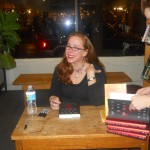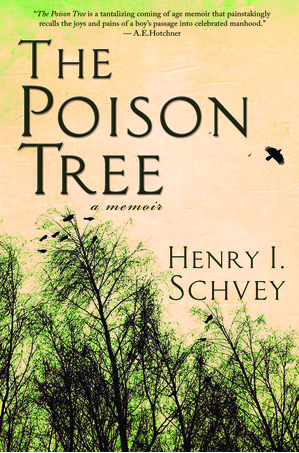Share the post "Hillary Jordan reads from new novel, When She Woke"
Hillary Jordan reads from new novel, When She Woke
by Diana Davis, Walrus Contributor

Hillary Jordan
Hilary Jordan was in town November 28 at Left Bank Books in the Central West End to talk about her second novel, When She Woke. Jordan began her presentation with a reference to the scaffold scene in the Scarlet Letter by Nathaniel Hawthorne. There are many parallels between Hester Prynne and Hannah Payne as both women were stigmatized by the societies in which they are forced to live. Hester is unjustly punished by the Puritans. Hannah is unjustly punished by a future version of our government which has been overtaken by religious fundamentalism and now reason and rights have been replaced with religious dogma.
After a calm reading, Jordan’s passion for her subject became very clear when she asserted with some force that she abhorred and detested fundamentalism, whether Christian fundamentalism (which she experienced when she lived in Texas and Oklahoma) or Moslem fundamentalism (which she experienced when she moved to Brooklyn, New York, where she now resides). She made it clear that she strongly believes that Americans should not blur the lines between church and state. It is a dangerous trend, one which we can see as now that the mega-churches are becoming more involved in politics. When a man in the audience said her stance on abortion, the mega-churches and government might get her book banned in some places. Jordan became highly animated again, rubbing her hands together with glee and exclaiming, “I’m dying for someone to ban my book! I just can’t wait.”
The audience also asked Jordan about her background and how she got started writing. She responded that she holds a B.A. in English and political science from Wellesley College. After which, she spent fifteen years working as an advertising copywriter for such companies as Chiat/Day, Inc. and Oglesby advertising agencies, among others. Finally, she decided to freelance to support herself and enrolled in the M.F.A. program at Columbia University; she completed the program in 2004.
It was while in her graduate program that Jordan wrote a short story based on the life of her grandmother who had lived on a farm in the Mississippi Delta. Hillary enlarged the story into her first novel, MUDBOUND, a tale of racism and family secrets. She wrote all six characters, Negro and Caucasian, male and female in first person. It won the 2006 Bellwether Prize (founded by Barbara Kingsolver and awarded biennially to an unpublished debut novel that addresses issues of social justice) and the 2009 Alex Award from the American Library Association. MUDBOUND was also the 2008 New Atlantic Independent Booksellers Association Fiction Book of the Year. It has been translated into French, Italian and Serbian, Swedish and Norwegian editions which will be out in 2012.
Audience members were interested in how Jordan came to be a published author, to which Jordan credits finding the perfect agent who found her the perfect publisher. After 13 inquiries and 11 rejections, she received a positive response from Chris Parris-Lamb of the Gernert Company, who led her to Algonquin Books.
Jordan was inspired to write When She Woke from a discussion about the drug problem in America which she had with an opinionated uncle years before. Her uncle suggested that drugs should be made legal and provided by the government, but that people who took the drugs should have their skin color changed from flesh tone to bright blue so the rest of the population would know to stay away from drug addicts. That idea of such stigmatization stuck, like a dart, in the back of her mind only to resurface 20 years later as she began to write When She Woke.
When She Woke is a sinister and spell-binding tale, which takes Hannah Payne through series of awakenings–spiritual, intellectual, and sexual–and she ultimately discovers that she is stronger than she had originally thought herself to be. The novel begins with Hannah Payne awakening to find that she has been chromed (injected with a virus that changed her skin tone to blood red). She is dressed in a paper gown and, for a month, each move, each breath, and each expression is broadcast into the homes of reality television viewers across America who watch this dark and sinister entertainment as they eat popcorn and drink beer. It is a new punishment for a new world. Every “criminal” is marked and “monitored” by the government. Each crime has its associated color: red for murder or abortion, blue for child molestation, green for armed robbery or financial failings, yellow for misdemeanors, etc. This is a world where the law reflects religious fundamentalism–a world where the government is expected to pass judgment on the moral character of its citizens. Hannah’s crime is abortion. To compound her error, she refused to name the father because she still loves him and wants to protect him. She is tried and sentenced to be an outcast. The book revolves around how she copes with the stigma of being red and of living her life in a hostile and judgmental world.


